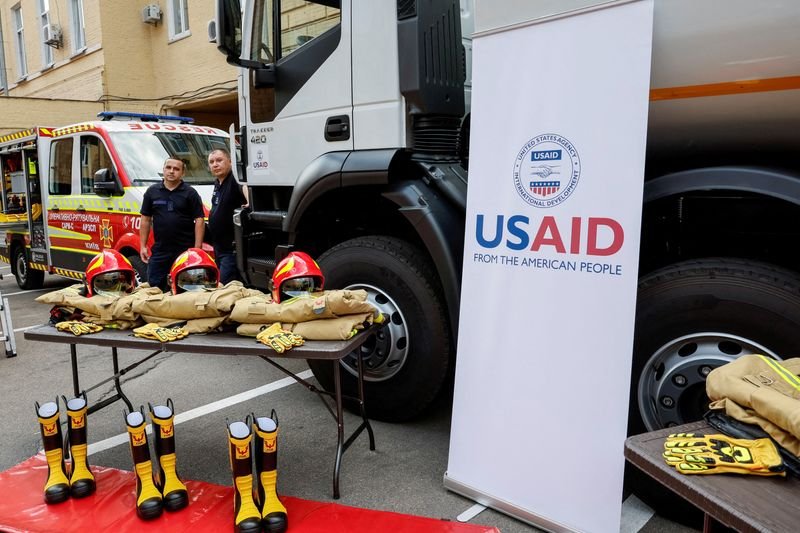Trump's freeze on US aid rings alarm bells from Thailand to Ukraine
Published by Global Banking & Finance Review®
Posted on January 28, 2025
4 min readLast updated: January 27, 2026

Published by Global Banking & Finance Review®
Posted on January 28, 2025
4 min readLast updated: January 27, 2026

Trump's freeze on US aid alarms global aid groups, affecting humanitarian efforts and funding for critical programs worldwide.
By Thomas Escritt, Poppy McPherson and Jennifer Rigby
BERLIN/BANGKOK/LONDON (Reuters) - Field hospitals in Thai refugee camps, landmine clearance in warzones, and drugs to treat millions suffering from diseases such as HIV are among the programs facing the chop as President Donald Trump contemplates massive cuts to U.S. foreign aid.
Trump last week paused development assistance from the U.S. Agency for International Development (USAID) for 90 days to assess compatibility with his "America First" policy, setting alarm bells ringing among aid groups around the world that depend on U.S. largesse.
Humanitarian organisations and U.N. agencies say they could face drastic curbs on their ability to distribute food, shelter and healthcare if the freeze becomes permanent.
The U.S. is by far the biggest contributor to global humanitarian aid, supplying an estimated $13.9 billion in 2024, accounting for 42% of all aid tracked by the United Nations.
Clinics at camps in Thailand providing shelter for about 100,000 refugees from Myanmar were ordered to shut after the U.S. froze funding to the International Rescue Committee, according to a senior aid worker.
Washington said it would grant waivers to the freeze in some areas including emergency food assistance, according to a memo seen by Reuters. Bangladesh's government said in a statement that the U.S. had granted a waiver for emergency food aid to more than a million Rohingya refugees sheltering in Bangladesh.
But the exemption does not apply to other humanitarian programming. A Bangladesh-based aid worker said organisations working on shelter, for example, would not be able to buy new materials for building and fixing homes for refugees.
The cuts will also affect the supply of lifesaving drugs for HIV, malaria and tuberculosis around the globe, which millions of people depend on, according to another memo seen by Reuters.
On Tuesday, contractors and partners who work with USAID began receiving such memos to stop work immediately.
'CATASTROPHIC'
"This is catastrophic," said Atul Gawande, former head of global health at USAID who left the agency this month. "Donated drug supplies keeping 20 million people living with HIV alive. That stops today."
The cuts will affect organisations working with 6.5 million orphans and vulnerable children with HIV in 23 countries, Gawande said.
World Food Program (WFP) Country Director for Afghanistan Hsiao-Wei Lee told Reuters she was concerned about the freeze given that the WFP was already only receiving about half the aid it needed for Afghanistan, and that over 6 million people were surviving on "just bread and tea".
The WFP received $4.7 billion from the U.S. last year, accounting for 54% of its funding, according to the UN.
Other agencies said they would be unaffected by the freeze. United Nations High Commissioner for Refugees (UNHCR) spokesperson Matthew Saltmarsh said the agency didn't receive funding from USAID.
Independent media outlets that receive external funding in countries with authoritarian governments may struggle to survive, say media freedom activists.
In Georgia, where a "foreign agents law" passed last year established punitive fines for NGOs that fail to declare receiving more than 20% of their funding from overseas, Shalva Papuashvili, speaker of parliament from the Georgian Dream ruling party, welcomed the U.S. aid freeze.
"I was pleasantly surprised when Trump's executive order was based on the fact that international assistance, in some cases, is used to create certain... chaos on the ground, including harming U.S. interests," he was quoted as saying by Georgian media.
LANDMINES AND EDUCATION
In 2023, the U.S. was the largest landmine action donor with a total contribution of $310 million, representing 39% of all international support, according to the International Campaign to Ban Landmines. Syria, Myanmar, Ukraine and Afghanistan were among the countries where uncleared mines claim most lives.
The State Department said on Sunday that the U.S. government must refocus on American national interests in its role as steward of taxpayer dollars.
"President Trump stated clearly that the United States is no longer going to blindly dole out money with no return for the American people. Reviewing and realigning foreign assistance on behalf of hardworking taxpayers is not just the right thing to do, it is a moral imperative," the State Department said.
Oksana Matiiash, board chair at Teach for Ukraine, an NGO that trains graduates and specialists as teachers to improve the education system, said there was growing panic in Ukraine's NGO sector.
"It's not just funding that's frozen. Behind every grant are real people working in unimaginable conditions," Matiiash wrote on LinkedIn.
(Reporting by Thomas Escritt in Berlin, Poppy McPherson in Bangkok, Jennifer Rigby in London, Felix Light in Tbilisi, Ludwig Burger in Frankfurt; Writing by Charlie Devereux; Editing by Ros Russell)
Programs such as field hospitals in Thai refugee camps, landmine clearance, and drugs for diseases like HIV are among those facing cuts due to the freeze.
The US is the largest contributor, supplying an estimated $13.9 billion in 2024, which accounts for 42% of all aid tracked by the United Nations.
The US government stated that waivers would be granted for emergency food assistance, but other humanitarian programs will not receive similar exemptions.
The cuts will impact organizations that support 6.5 million orphans and vulnerable children with HIV across 23 countries, jeopardizing their access to lifesaving drugs.
President Trump emphasized that the US would no longer provide aid without ensuring a return for American taxpayers, prompting a review of foreign assistance programs.
Explore more articles in the Headlines category



